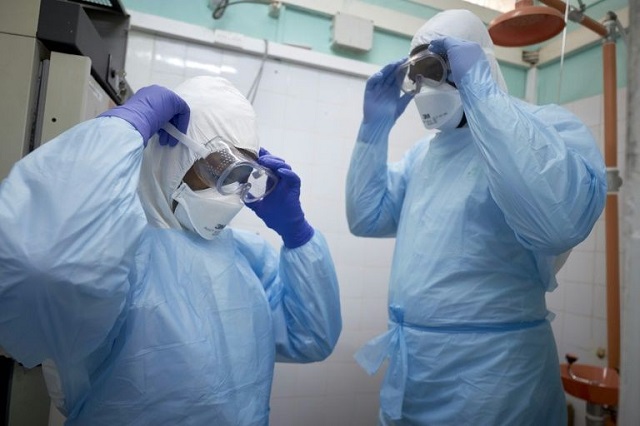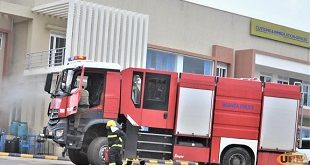
Kampala, Uganda | THE INDEPENDENT | Most health workers at four Makerere University Teaching Hospitals have a negative attitude toward COVID-19 patients.
This was revealed in an online cross-sectional study conducted at Mulago National Referral Hospital, Mulago Specialized Women and Neonatal Hospital, Kiruddu National Referral Hospital and Kawempe National Referral Hospital.
The hospitals are components of Mulago Hospital Complex, the largest public hospital in Uganda with the estimated bed capacity of 1,800. There are between 1,300–1,500 healthcare workers in the four hospitals including nurses, midwives, intern doctors, medical officers, senior house officers and specialists.
First published in the Journal of Frontiers in Public Health in April, the study that had sought to determine knowledge, attitude and practices of health care workers toward COVID-19 in the country, shows that only 21 percent of the participants demonstrated a good attitude.
“About four-fifths of the respondents had a poor attitude toward COVID-19 and just over 70 percent of the health care workers had good practices toward COVID-19 especially those aged 40 years or more,” says the descriptive study undertaken through WhatsApp Messenger.
This is the first study in Uganda and sub-Saharan Africa to assess the knowledge, attitude and practice of health care workers towards COVID-19. It was undertaken by five medical researchers both from Makerere and Gulu Universities in the wake of coronavirus disease, an emerging public health problem threatening the lives of over 3.5 million people globally.
Although researchers approached 581 health workers during the study, only 136 responded. Results however show that only 44 percent of the health workers in the study agreed that they could confidently participate in the management of patients with COVID-19, implying that adequate information on case management should be provided to the health workers.
It recommended continued professional education among health workers in Uganda to improve their knowledge henceforth averting negative attitudes and promote positive preventive and therapeutic practices. “We recommend follow up studies involving teaching and non-teaching hospitals across the country,” said the researchers.
When asked about the preparedness of Uganda, up to 29 percent believed that Uganda was not in a good position to contain the COVID-19 pandemic. Researchers say healthcare workers are at the frontline of COVID-19 pandemic response and are exposed to dangers like pathogens, long working hours, psychological distress, fatigue, occupational burnout and stigma as well as physical violence.
They contend that a poor understanding of the disease among health workers can result in delayed identification and treatment leading to rapid spread of infections. They thus recommend further education and training through continuous professional education and journal clubs, particularly on symptoms and transmission as essential in improving the knowledge of health workers about COVID-19 in our setting.
About 17 percent of the health workers believed that wearing general medical masks was not protective against COVID-19. It also shows that health workers in Makerere University Teaching Hospitals have good COVID-19 prevention practices. For instance, the majority of them are following infection prevention and control practices of regular hand hygiene, social distancing and wearing a face mask when in high-risk situations as recommended by the Ministry of Health and WHO.
Up to 93 percent and 96 percent of health workers reported wearing a face mask when in contact with patients and washing hands before/after handling patients. However, up to 60 percent of health workers admitted having avoided patients with symptoms suggestive of COVID-19. This, researchers suspect can be attributed to a shortage of personal protective equipment which has become a global problem.
Additionally, knowledge on COVID-19 was significantly higher among health workers who used news media such as televisions and newspapers and those aged 18–39 were more knowledgeable about COVID-19. The disease was first reported in December 2019 among patients with viral pneumonia symptoms in Wuhan, China.
******
URN
 The Independent Uganda: You get the Truth we Pay the Price
The Independent Uganda: You get the Truth we Pay the Price


